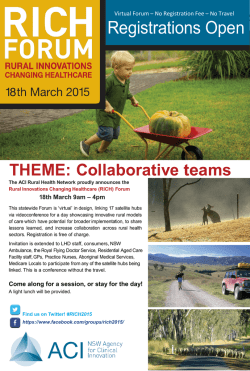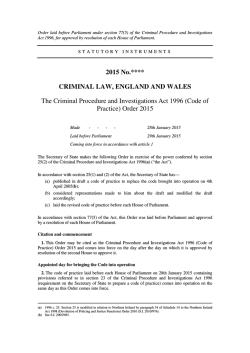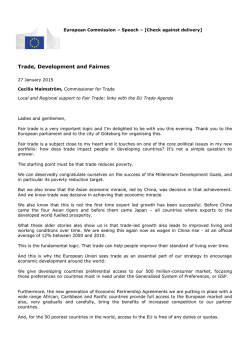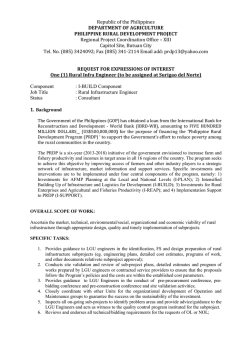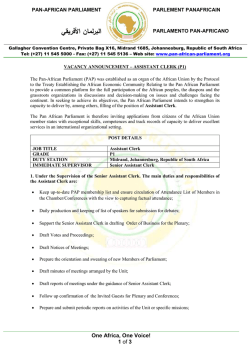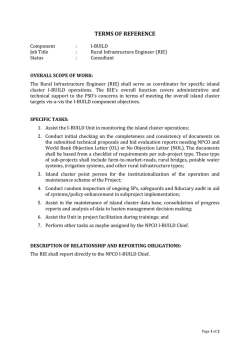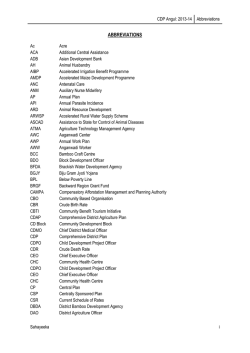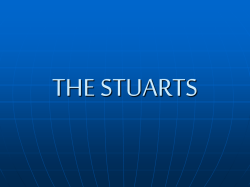
Research for the European Parliament Committee on Agriculture
At a Glance Research for the European Parliament Committee on Agriculture and Rural Development in 2015 The Policy Department provides high-level independent expertise, analysis and policy advice to assist parliamentary bodies. Written expertise is prepared either in house or by outside researchers. The Policy Department also organises events such as workshops, policy hubs and conferences. This document lists the written expertise prepared by outside researchers and published by the Policy Department for the European Parliament Committee on Agriculture and Rural Development in 2015. Two studies prepared for Committee Delegations, prepared in house, are also mentioned. TOWARDS NEW RULES FOR THE EU'S FRUIT AND VEGETABLES SECTOR - AN EU NORTHERN MEMBER STATES PERSPECTIVE Summary: This study analyses the situation of the fruit and vegetables sector in the EU Northern Member States. It also suggests possible improvements of EU rules. The study was presented to the Committee on Agriculture and Rural Development on 22 January 2015. Author: Wageningen University: Jos Bijman. VERS DE NOUVELLES RÈGLES POUR LE SECTEUR EUROPÉEN DES FRUITS ET LÉGUMES - ANALYSE APPROFONDIE DANS LES PAYS DU SUD DE L'EUROPE Résumé: Cette étude fournit une analyse du secteur des fruits et légumes dans les pays du sud de l’Europe, ainsi que des pistes d’amélioration du régime européen applicable au secteur. Elle a été présentée à la Commission de l’Agriculture et du Développement Rural le 22 janvier 2015. Auteurs: Assemblée des Régions Européennes Fruitières Légumières et Horticoles: (AREFLH) : Luciano Trentini et Jacquess Dasque . EXTENT OF FARMLAND GRABBING IN THE EU Summary: This study looks at the rise of large-scale land deals, ‘land grabbing’, in the EU. It finds significant evidence that farmland grabbing is underway in the EU today. It discusses a number of the drivers of farmland grabbing in the EU and examines the impacts of farmland grabbing for European food security and food sovereignty, rural employment and vitality, and environmental sustainability. It argues that farmland grabbing, especially when connected to other burning European land issues, calls for a reform of European land governance. Author: Transnational Institute: Sylvia Kay, Jonathan Peuch, Jennifer Franco. COMAGRI DELEGATION TO SAVOIE AND HAUTE-SAVOIE (original FR) ES DE EN FR IT RO Summary: This study is intended for MEPs on the European Parliament Committee on Agriculture and Rural Development visiting Savoie and Haute-Savoie in July 2015. This document provides an overview of the region, describes its farming and forestry sector and details the implementation of the new post-2014 CAP in France and in the departments of Savoie and Haute-Savoie. Author: Guillaume Ragonnaud, Policy Department B, European Parliament. DG IPOL Policy Department for Structural and Cohesion Policies European Parliament PE 563.417 January 2016 January 2015 61 p. January 2015 85 p. May 2015 78 p. May 2015 52 p. COMPARISON OF FARMERS’ INCOMES IN THE EU MEMBER STATES June 2015 EN FR IT Summary: With the main stated objectives of the CAP in mind, relevant comparisons that involve the incomes of farmers are made. EU official data sources are used to describe income differences between holdings of different sizes and types and between Member States. Comparisons between the incomes of farmer household and other groups in society have to rely on ad hoc information. Recommendations relate to the support of small farms, actions to mitigate instability and to fill the important gap in farm household income information. Author: Berkeley Hill (University of London, the UK) and B. Dylan Bradley (Agra CEAS Consulting, the UK). IMPLEMENTATION OF THE FIRST PILLAR OF THE CAP 2014 - 2020 IN THE EU MEMBER STATES AND ANNEXES Summary: The 2014-2020 reform introduced many relevant changes in the tool box of the CAP. Within Pillar I, one of the most relevant issues has been that of direct payments, which became more targeted at specific goals than they have been in the past. Another key issue is the role of Member States in tailoring the new CAP according to the needs of their primary sector. Consequently, what we face today in the EU28 is a multifaceted form of agricultural support under a common EU framework. Author: Consiglio per la ricerca in agricoltura e l’analisi dell’economia agraria (Council for Agricultural Reseach and Economics) (CRA-INEA), Roma, Italy: Roberto Henke (project leader), Maria Rosaria Pupo D’Andrea (scientific editor), Theodoros Benos (consultant), Tatiana Castellotti, Fabio Pierangeli, Simona Romeo Lironcurti - Università di Roma Tre, Roma, Italy: Fabrizio De Filippis, Mara Giua, Laura Rosatelli - Bundesanstalt für Agrarwirtschaft (Federal Institute of Agricultural Economics, AWI) Vienna, Austria: Thomas Resl, Karin Heinschink. July 2015 135 p. July 2015 OVERVIEW OF THE AGRICULTURAL INPUTS SECTOR IN THE EU Summary: This study analyzes the seed, feed, energy, fertilizer, and plant protection agents farm input sectors from two perspectives: the demand side and the supply side. Average input shares in the EU-27 for seeds and fertilizers declined while they increased for feeds. Market concentration is the largest in the plant protection agents sector followed by the energy sector, and lowest in the feed sector. Author: Wageningen University: Justus Wesseler, Alessandro Bonanno, Dušan Drabik, Valentina C. Materia, Luca Malaguti, Marcel Meyer, and Thomas J. Venus. COMAGRI DELEGATION TO THE AZORES ISLANDS (original ES) ES DA DE EN FR IT PL PT Summary: This study was drawn up for the delegation of the European Parliament Committee on Agriculture and Rural Development to the Azores Islands (Portugal) in November 2015. It consists of: an introduction presenting the key demographic and political data; an overview of the Islands' regional economy; a specific chapter on agriculture; lastly, ongoing rural development programmes and those supporting agriculture in the outermost regions of the Azores are described. Author: Albert Massot, Policy Department B, European Parliament. Feedback 132 p. 128 p. September 2015 42 p. If you wish to give us your feedback please e-mail to Poldep-Cohesion Secretariat: [email protected] Disclaimer This document is provided to Members of the European Parliament and their staff in support of their parliamentary duties and does not necessarily represent the views of the European Parliament. Policy Department for Structural and Cohesion Policies Within the European Parliament’s Directorate-General for Internal Policies, the Policy Department is the research unit which supplies technical expertise to the following five parliamentary Committees: Agriculture and Rural Development; Culture and Education; Fisheries; Regional Development; Transport and Tourism. Expertise is produced either inhouse or externally. All AGRI publications: http://www.europarl.europa.eu/studies Policy Department B - Structural and Cohesion Policies - AGRI 2
© Copyright 2026
